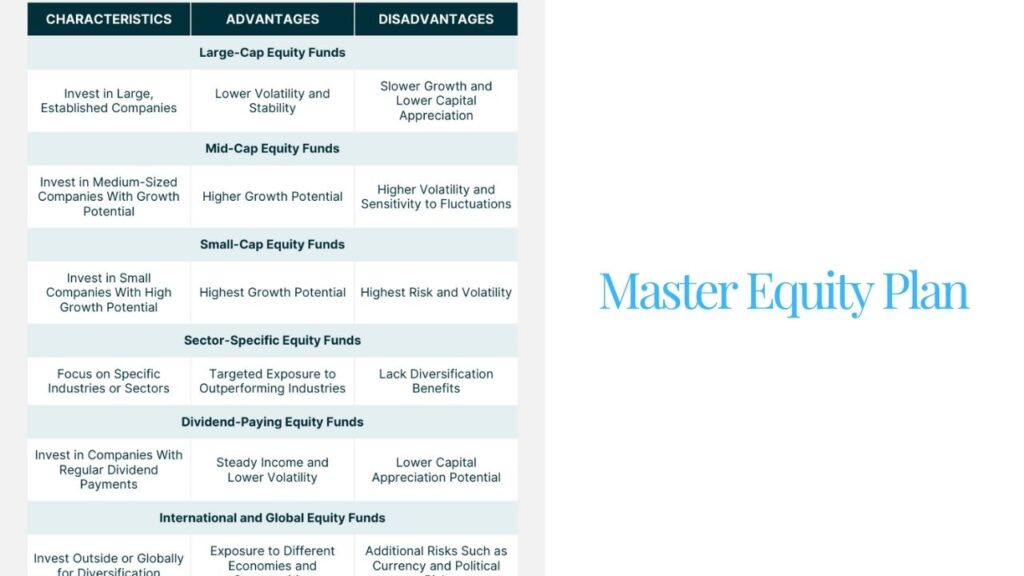Master Equity Plans (MEPs) provide businesses with an effective method for offering equity compensation to employees, which has become an increasingly popular way of motivating workers while simultaneously increasing employee loyalty, productivity and job satisfaction. By giving employees a stake in their employer’s success they can create an engaged and collaborative workplace environment.
What Are My Equity Compensation Options Under a Master Equity Plan?
The equity compensation provided can differ based on an organization’s goals, structure and workforce needs. Here are the most commonly offered in Master Equity Plans:
- Stock Options: Stock options provide employees the right to acquire company shares at an agreed-upon price after fulfilling a certain vesting period, providing an incentive for contributing to company growth as their options’ value grows alongside it. This reward may further motivate employees by rewarding those contributing directly.
- Restricted Stock Units (RSUs): RSUs offer employees shares as rewards upon reaching certain performance metrics or length of service milestones, helping ensure long-term employee loyalty within an organization.
- Employee Stock Purchase Plans (ESPPs): Employees can invest in company stock at a discount through payroll deduction, encouraging investment while aligning employees’ financial interests with that of the organization. This method not only fosters employee participation but also aligns financial interests more closely with the performance objectives of an ESPP company.
How Does a Master Equity Plan Benefit Businesses?
Implementation of a Master Equity Plan offers several advantages for businesses, including:
- Retain Top Talent: By offering equitable compensation packages, businesses can drastically enhance employee loyalty. When employees feel invested in the success of the business, they’re more likely to put forth extra efforts toward making it grow.
- Cost-Efficient Compensation: Offering stock options can be an economical and attractive way for early-stage businesses or startups to attract talent, while still incentivizing employees with reduced salaries while conserving cash reserves.
- Align of Interests: Employees whose interests align closely with those of the organization will tend to work harder at meeting its goals and increasing productivity as their commitment increases to reach its objectives. This could potentially increase productivity as well as create stronger commitment from leadership towards reaching those objectives.
- Attracting Skilled Workers: Equity compensation can play a pivotal role in drawing top talent into any competitive job market, often prompting skilled individuals to seek opportunities that offer both short and long-term financial gains.
- Master Equity Plans Can Foster Ownership & Accountability: By encouraging ownership within an organization and encouraging staff members to view themselves as stakeholders of it all, an effectively implemented Master Equity Plan can foster an environment in which staff feel engaged and motivated at work.
How Can Employees Build Wealth through a Master Equity Plan?
Participating in a Master Equity Plan can be an excellent way to accumulate wealth over time for employees. Here’s how it works:
- Employee Ownership Stake: Employees receiving equity compensation experience an increased sense of ownership over time as their company gains value, impacting directly upon their finances and well-being.
- Deferred Tax Advantages: Certain equity compensation forms such as stock options provide employees with tax incentives; employees usually only owe taxes when selling shares allowing them to take advantage of lower long-term capital gains tax rates.
- Potential for Significant Growth: When employees stay with an emerging company through all its growth stages, their equity may be greatly appreciated. This could lead to substantial improvements in their finances – something especially rewarding if employees were there from its infancy stages onward.
- Empowerment Through Investment: When employees understand themselves as investors in their organization, this mindset often results in higher performance levels and job satisfaction for all involved. This investment mindset may increase productivity while simultaneously leading to job security.
What Implementation Strategies Should Companies Adhere To?
To maximize the efficiency and success of a Master Equity Plan, businesses should employ strategic and systematic approaches, including:
- Define Your Goals: Clearly articulate the purpose of equity grants – are they intended to foster employee loyalty, recognize merit or bring in new talent?
- Choose an Appropriate Equity Compensation Model: Determine what equity compensation type best meets the growth stage, financial capacities and strategic goals of the business.
- Communicate Your Equity Plan Clearly: Employees need to understand exactly how an equity plan operates – including details on vesting schedules and tax implications – before signing on as members of any equity plan.
- Establish a Vesting Schedule: Establishing an effective vesting schedule helps employees avoid selling their shares prematurely while encouraging long-term employee commitment to your organization.
- Monitor and Adjust: Regular evaluation is crucial to the plan’s success; make any necessary modifications as your company changes. Involve yourself as the plan progresses by overseeing it with great diligence.
What Are My Legal and Financial Considerations?
Companies should carefully consider both legal and financial ramifications when developing Master Equity Plans. Engaging legal expertise to assist their implementation can assist businesses in adhering to regulations concerning equity compensation on local, state, and federal levels.
Financial advisors can also be relied upon to devise tax reduction strategies that ensure both their company and employees maximize the financial rewards from any investments or pay packages received from employers or employees.
What Challenges Could Reside From A Master Equity Plan?
While Master Equity Plans provide many advantages, some challenges may also emerge:
- Valuing Complex Options/RSUs: Assessing the fair value of issued stock options or RSUs may prove complex for startups that lack established market values for their shares.
- Potential Misalignment: Lack of communication about equity compensation may cause confusion among employees regarding its connection with company performance and employee equity holdings.
How Can Businesses Overcome These Challenges?
Businesses can address these challenges by taking several proactive measures:
- Cap Share Dilution: Place caps on total equity that may be issued, to prevent significant dilutive effects of existing shares that might diminish overall shareholder value.
- Stay Current on Valuations Updates: Provide timely insights into their stocks’ worth by informing employees regularly of your company’s valuation status.
- Educational Resources: Provide ongoing educational materials that educate employees about equity compensation plans and their use, to increase understanding and participation with these plans. This should foster better engagement.
How Do Stock Options Compare to RSUs?
| Feature | Stock Options | Restricted Stock Units (RSUs) |
|---|
| Ownership | Employees must purchase shares | Shares are granted outright |
| Tax Implications | Taxed at exercise and sale | Taxed when shares are vested |
| Vesting Requirement | Often has a vesting period | Typically has a vesting period |
| Risk Level | High risk, depending on stock price | Lower risk, as shares are guaranteed |
| Potential Gains | Significant if stock price increases | Gains depend on stock price at vesting |
This comparison table highlights the key distinctions between stock options and RSUs, providing both employees and businesses a means for selecting an ideal compensation structure based on risk tolerance and financial goals.
Conclusion
Master Equity Plans provide businesses and employees alike with an effective tool for long-term wealth building while building employee loyalty and productivity. By carefully considering types of equity compensation packages, communication methods, legal implications and legal compliance implications when developing these plans, companies can successfully implement Master Equity Plans into their operations to drive success while building an engaging corporate culture.
Related Articles:
HCC Share: What’s the Current Price?
Sanstar Share Price, Is This a Promising Market Entry?








